What Should Soccer Players Eat (Before and After Games)
If you’re wondering what should soccer players eat – this is for you.
Nutrition is a cornerstone of athletic performance, and for soccer players, it can make all the difference between dominating the field and feeling fatigued. What you eat before, during, and after a game can impact your energy levels, endurance, and recovery.
In this article, we’ll explore the essential guidelines and meal examples to help soccer players fuel their bodies effectively for peak performance on the pitch. From breakfast to dinner, we’ll delve into the best food choices to optimize energy, support muscle recovery, and enhance overall well-being.
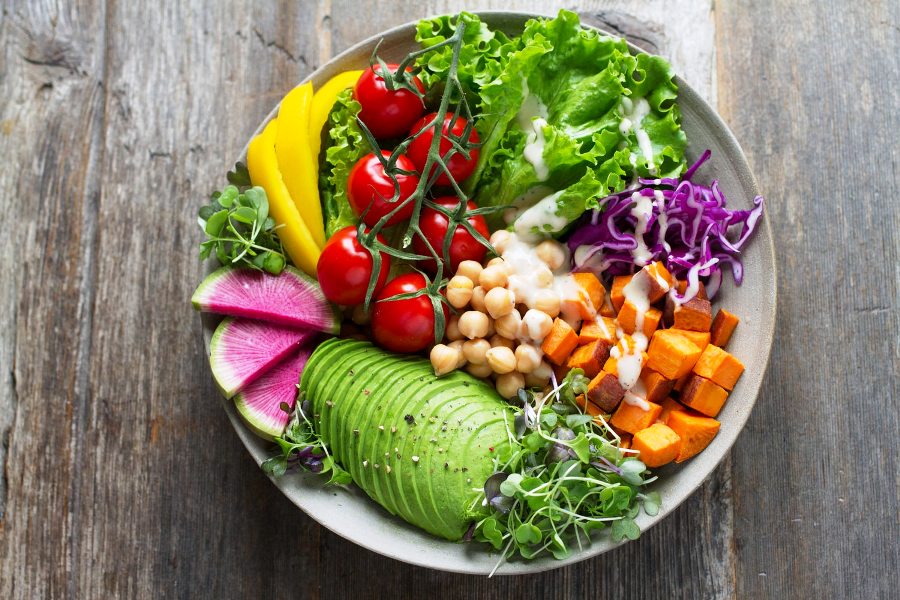
What Should Soccer Players Eat
In this article, you can read through all 5 sections or skip ahead to the topics that are most important to you. Make sure to stick around until the end, watch the video tutorial, and get your special free gift that is guaranteed to make you a better player.
- What should a soccer player eat
- What should soccer players eat before a game
- What should soccer players eat after a game
- What should soccer players eat for breakfast, lunch, or dinner
- How to become a better soccer player, improve faster & achieve more
I hope this article gives you all you need about what should soccer players eat – Let’s get started!
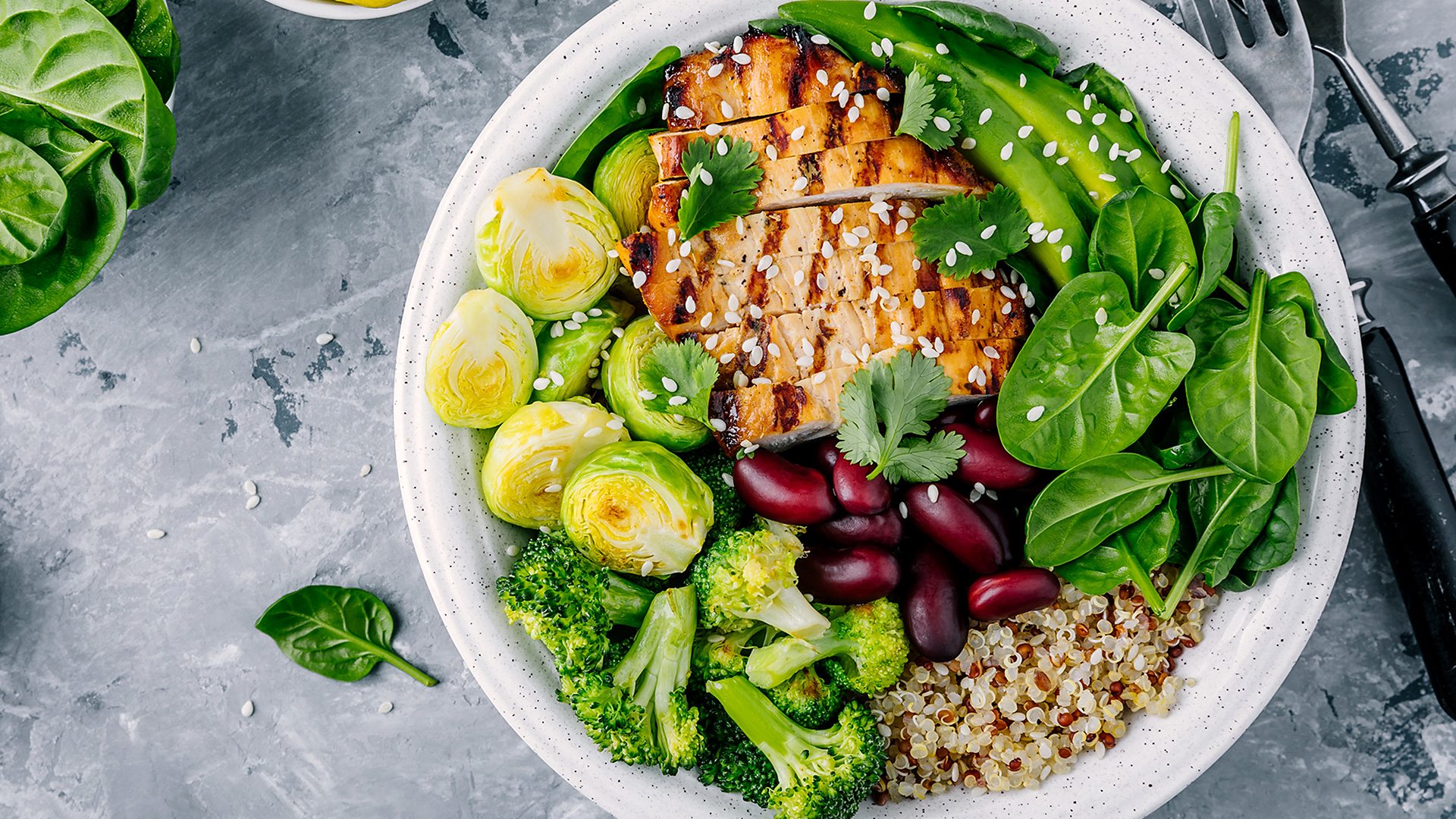
What Should A Soccer Player Eat
As a soccer player, what you eat plays a crucial role in your performance on the field. Here are some general guidelines on what a soccer player should eat:
- Balanced Diet: Aim for a balanced diet that includes a variety of foods from all food groups. This means incorporating carbohydrates, proteins, fats, fruits, vegetables, and plenty of water into your meals.
- Carbohydrates: Carbs are your body’s primary source of energy, making them essential for soccer players. Opt for complex carbohydrates like whole grains, fruits, and vegetables, which provide sustained energy throughout the game.
- Proteins: Protein is crucial for muscle repair and growth, making it important for soccer players to include in their diet. Lean sources of protein such as chicken, fish, eggs, beans, and tofu are ideal choices.
- Healthy Fats: Don’t shy away from healthy fats, as they provide long-lasting energy and support overall health. Incorporate sources of healthy fats like avocados, nuts, seeds, and olive oil into your meals.
- Hydration: Proper hydration is key for optimal performance and recovery. Drink plenty of water throughout the day, especially before, during, and after training sessions and games. Electrolyte-rich beverages like sports drinks can also help replenish lost fluids during intense exercise.
- Pre-Game Meal: Eat a balanced meal 2-3 hours before a game or practice session. Focus on carbohydrates for energy, moderate protein for muscle support, and include some healthy fats for sustained fuel.
- Post-Game Recovery: After a game or intense training session, refuel your body with a combination of carbohydrates and protein to replenish glycogen stores and support muscle recovery. Chocolate milk, yogurt with fruit, or a turkey sandwich on whole-grain bread are good options.
- Snack Smart: Keep healthy snacks on hand for quick energy boosts throughout the day. Snacks like fruit with nut butter, Greek yogurt with granola, or trail mix are convenient and nutritious choices.
Remember, everyone’s nutritional needs are different, so it’s essential to listen to your body and adjust your diet accordingly. Experiment with different foods and meal timing to find what works best for you and enhances your performance on the soccer field.
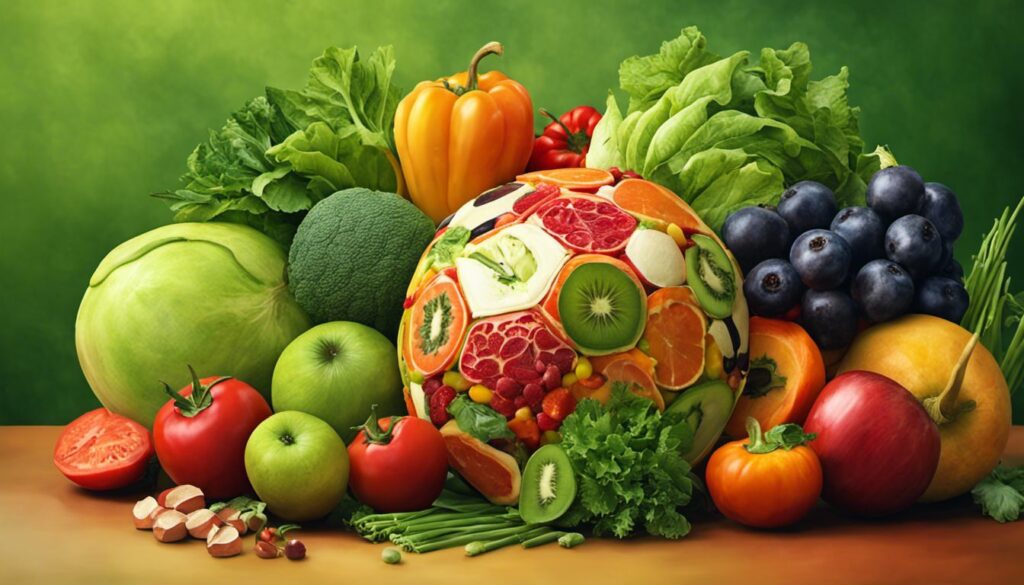
What Should Soccer Players Eat Before A Game
Fueling your body properly before a soccer game is crucial for optimal performance on the field. Here are some guidelines and examples of what soccer players should eat before a game:
- Timing: Aim to eat your pre-game meal 2-3 hours before kick-off to allow for proper digestion and absorption of nutrients.
- Carbohydrates: Focus on consuming carbohydrates that provide sustained energy. Choose complex carbohydrates such as whole grains, fruits, and vegetables over simple sugars. Examples include:
- Whole grain pasta with marinara sauce and grilled chicken
- Brown rice with black beans and roasted vegetables
- Quinoa salad with mixed vegetables and grilled tofu
- Proteins: Include a moderate amount of lean protein to support muscle repair and growth. Opt for sources like chicken, turkey, fish, tofu, or beans. Examples include:
- Grilled salmon with sweet potato and steamed broccoli
- Turkey sandwich on whole-grain bread with avocado and spinach
- Lentil soup with whole-grain bread and a side salad
- Hydration: Drink plenty of water leading up to the game to ensure you’re well-hydrated. Avoid excessive caffeine or sugary drinks, as they can lead to dehydration. Examples of hydrating beverages include:
- Water with a slice of lemon or lime
- Coconut water
- Herbal tea
- Avoid Heavy or Greasy Foods: Steer clear of foods that are high in fat or fiber, as they can lead to digestive discomfort during the game. Avoid fried foods, heavy sauces, and excessive amounts of cheese.
- Snack Option: If you’re unable to have a full meal 2-3 hours before the game, opt for a light snack 30-60 minutes beforehand. Choose something easily digestible that provides quick energy, such as:
- Banana with peanut butter
- Granola bar
- Greek yogurt with honey and berries
Remember to listen to your body and adjust your pre-game meal based on your individual preferences and dietary needs. Experiment with different foods and meal combinations to find what works best for you and helps you perform at your peak on the soccer field.
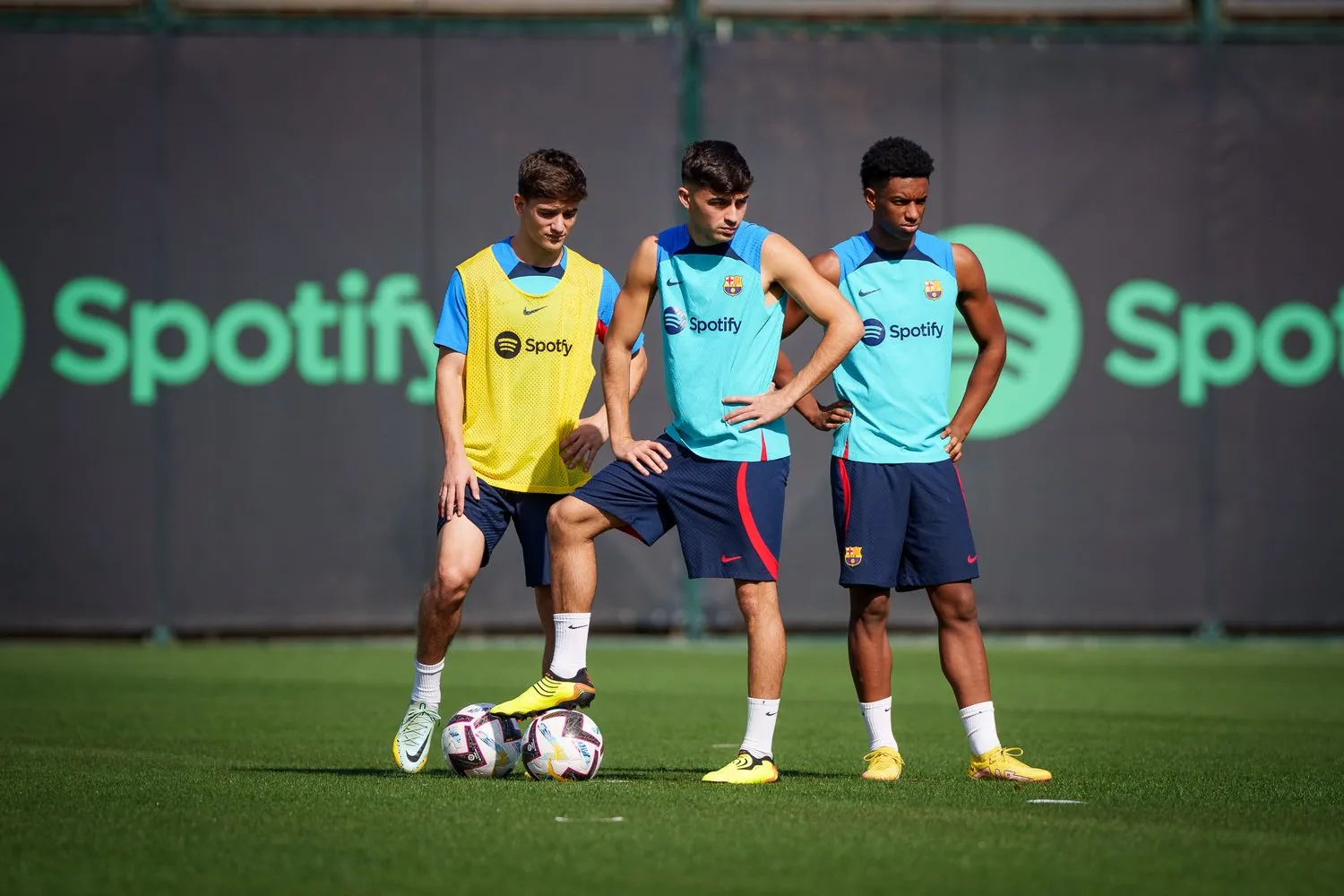
What Should Soccer Players Eat After A Game
After a soccer game, it’s essential to refuel your body with the right nutrients to support recovery and replenish energy stores. Here are some guidelines and examples of what soccer players should eat after a game:
- Timing: Aim to eat a post-game meal or snack within 30-60 minutes after the game to kick-start the recovery process.
- Carbohydrates: Replenish glycogen stores by consuming carbohydrates to restore energy levels. Choose complex carbohydrates combined with some simple sugars for quick absorption. Examples include:
- Whole grain wrap with turkey, avocado, and mixed greens
- Fruit smoothie made with banana, berries, Greek yogurt, and a splash of honey
- Brown rice bowl with grilled chicken, steamed vegetables, and teriyaki sauce
- Proteins: Support muscle repair and recovery with a source of lean protein. Aim for a combination of complete and incomplete proteins. Examples include:
- Grilled chicken breast with quinoa and roasted sweet potatoes
- Tofu stir-fry with brown rice and mixed vegetables
- Egg omelet with spinach, tomatoes, and whole grain toast
- Hydration: Rehydrate your body by drinking plenty of fluids after the game. Water is essential, but you can also include electrolyte-rich beverages like sports drinks to replace lost fluids and minerals. Examples include:
- Watermelon chunks
- Electrolyte-enhanced sports drinks
- Coconut water
- Anti-inflammatory Foods: Incorporate foods rich in antioxidants and anti-inflammatory properties to help reduce muscle soreness and inflammation. Examples include:
- Leafy green salads with colorful vegetables like bell peppers, carrots, and tomatoes
- Salmon or tuna salad with mixed greens and avocado
- Greek yogurt parfait with berries and almonds
- Avoid Excessive Fat and Sugar: While it’s okay to indulge occasionally, try to avoid consuming excessive amounts of high-fat or sugary foods after the game, as they can slow down the recovery process and lead to energy crashes.
Remember to listen to your body and choose foods that make you feel good and support your recovery. Experiment with different post-game meals and snacks to find what works best for you and helps you bounce back quickly for your next match.
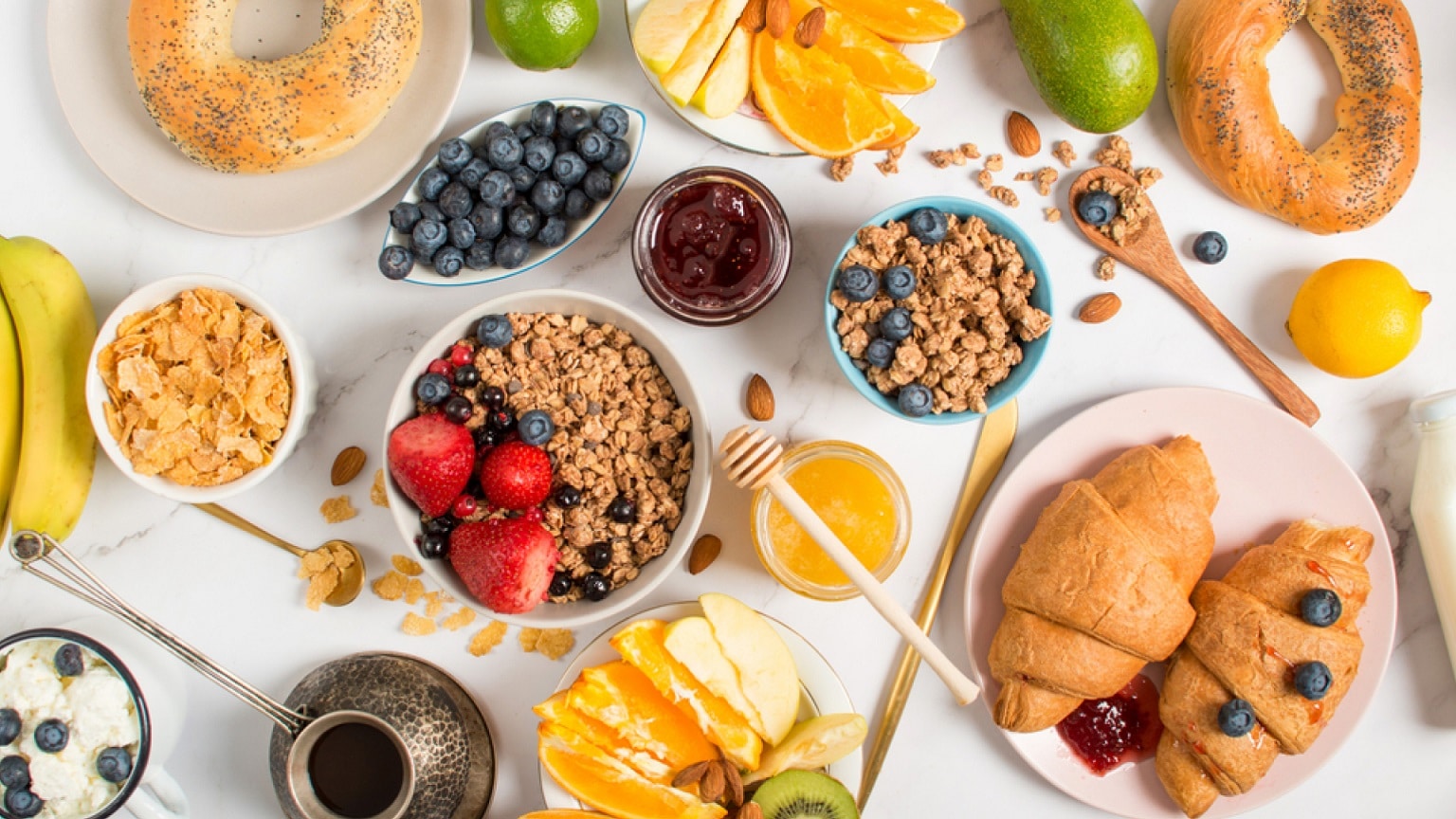
What Should Soccer Players Eat For Breakfast, Lunch, or Dinner
Here are three examples of meals for breakfast, lunch, and dinner that are suitable for soccer players:
Breakfast:
- Whole Grain Pancakes with Fruit and Greek Yogurt:
- Whole grain pancakes made with oats, whole wheat flour, and almond milk
- Topped with sliced bananas, berries, and a drizzle of honey
- Served with a side of Greek yogurt for added protein and calcium
- Vegetable Omelet with Avocado Toast:
- Three-egg omelet filled with spinach, tomatoes, bell peppers, and onions
- Served with a slice of whole grain toast topped with mashed avocado and a sprinkle of red pepper flakes
- Side of sliced oranges or grapefruit for extra vitamin C and hydration
- Smoothie Bowl with Nut Butter and Granola:
- Blend together frozen mixed berries, banana, spinach, Greek yogurt, and almond milk until smooth
- Pour into a bowl and top with a dollop of almond or peanut butter, granola, and sliced almonds
- Garnish with additional fruit like sliced strawberries or kiwi for added flavor and nutrients
Lunch:
- Grilled Chicken Caesar Salad Wrap:
- Grilled chicken breast sliced and tossed with romaine lettuce, cherry tomatoes, Parmesan cheese, and Caesar dressing
- Wrapped in a whole grain tortilla or flatbread
- Served with a side of carrot and cucumber sticks with hummus for added crunch and nutrients
- Quinoa Salad with Chickpeas and Roasted Vegetables:
- Cooked quinoa mixed with roasted vegetables (such as bell peppers, zucchini, and eggplant) and chickpeas
- Tossed with a lemon-tahini dressing made with olive oil, lemon juice, tahini, garlic, and salt
- Sprinkle with chopped fresh herbs like parsley or cilantro for added flavor
- Turkey and Avocado Sandwich on Whole Grain Bread:
- Sliced turkey breast layered with mashed avocado, lettuce, tomato, and sprouts on whole grain bread
- Served with a side of mixed greens salad dressed with balsamic vinaigrette
- Optional: add a slice of cheese or a spread of hummus for extra flavor and protein
Dinner:
- Grilled Salmon with Quinoa and Steamed Broccoli:
- Grilled salmon fillet seasoned with lemon pepper and served with a side of cooked quinoa and steamed broccoli
- Drizzle salmon with a homemade honey-mustard glaze made with Dijon mustard, honey, and a splash of apple cider vinegar
- Garnish with fresh herbs like dill or parsley for added flavor
- Vegetarian Stir-Fry with Tofu and Brown Rice:
- Stir-fry tofu with mixed vegetables (such as bell peppers, snap peas, carrots, and mushrooms) in a soy-ginger sauce
- Serve over cooked brown rice or quinoa
- Sprinkle with sesame seeds and chopped green onions for garnish
- Whole Wheat Pasta Primavera with Grilled Chicken:
- Whole wheat pasta tossed with a variety of sautéed vegetables (such as cherry tomatoes, bell peppers, zucchini, and asparagus) in a light olive oil and garlic sauce
- Top with grilled chicken breast strips for added protein
- Finish with a sprinkle of grated Parmesan cheese and fresh basil leaves for extra flavor
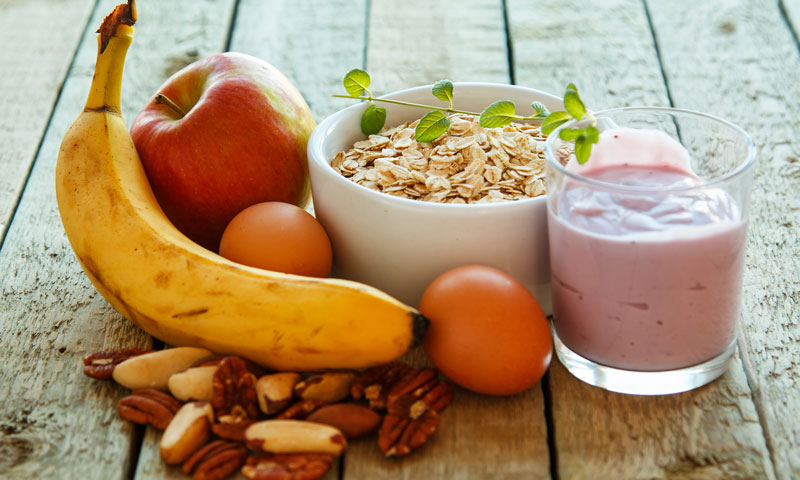
What Should Soccer Players Be Eating
In the fast-paced world of soccer, proper nutrition is a game-changer. By following these guidelines and incorporating nutritious meals into your daily routine, you can give yourself a competitive edge on the field. Remember, every player is unique, so listen to your body and adjust your diet accordingly.
Whether it’s a hearty breakfast to kick-start your day, a balanced lunch to fuel your afternoon training session, or a nourishing dinner to support recovery after a game, the right foods can help you perform at your best and achieve your soccer goals.
So, fuel up, stay hydrated, and let your nutrition be the secret weapon in your arsenal as you strive for success on the soccer field.
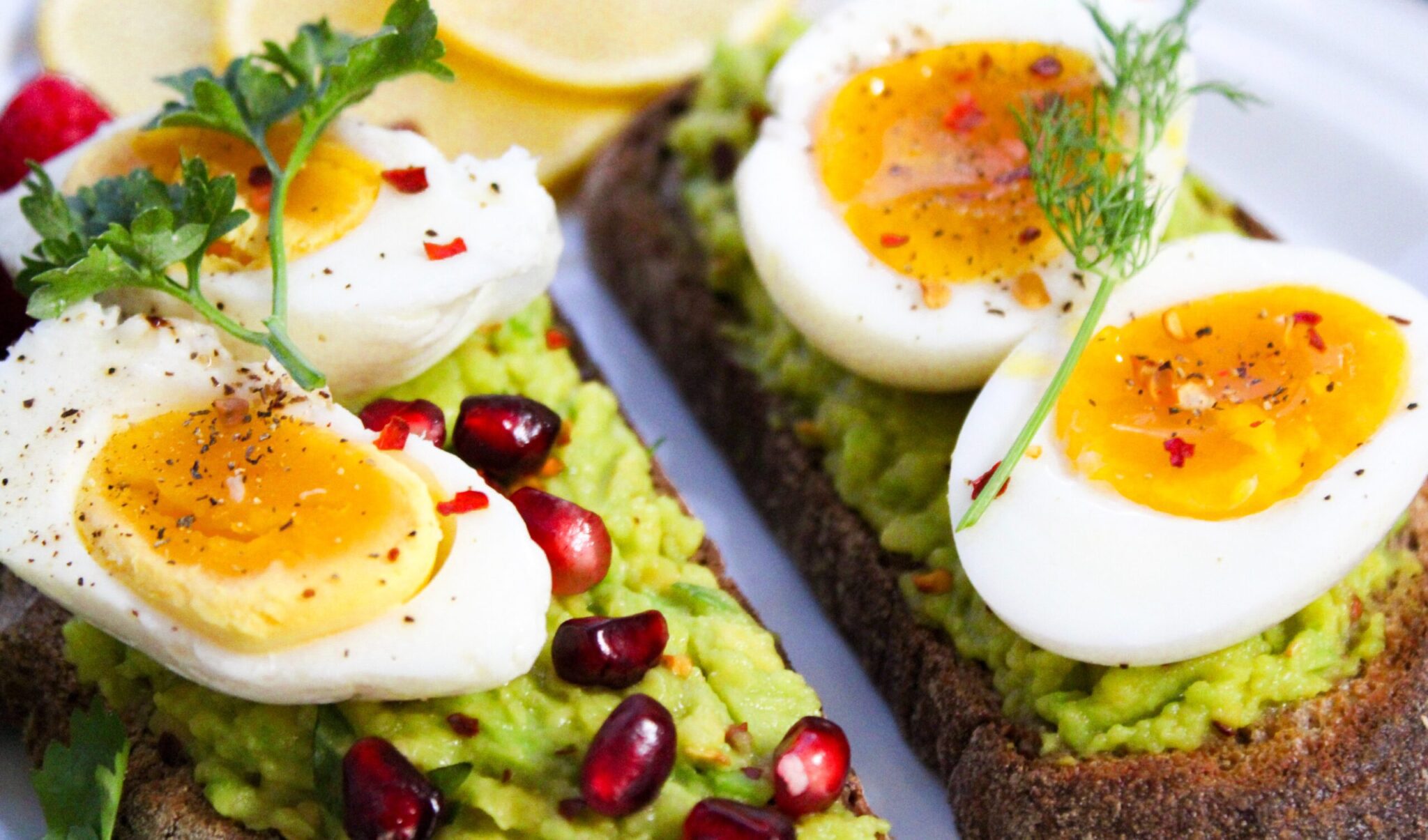
How To Become A Better Soccer Player
If you want to become a better soccer player, check out this 3-minute video. It’s not just another tutorial — it’s designed to help you understand your true potential as a soccer player.
Whether you’re a beginner or advanced player, the video explains how to improve your skills, develop your mindset, increase soccer IQ, and enhance your physical fitness.
You can start playing better, getting more respect from teammates, impressing your coaches, and performing with confidence under pressure.
Watch the video and discover how can your player transformation today:
Improve Your Game Today
Imagine the satisfaction of looking back and realizing that today was the day you decided to push yourself a little harder, run a little faster, and train a little longer. Tomorrow’s success is built on the decisions you make today.
Don’t wait for the perfect moment; make this moment perfect by committing to your improvement. Greatness isn’t found in procrastination — but by taking action today.
Seize the opportunity, embrace the challenge, and make a positive step towards your success. The future you want, is created by the decisions you make today.
If you really want to take another strong step in the right direction…
( continue reading )
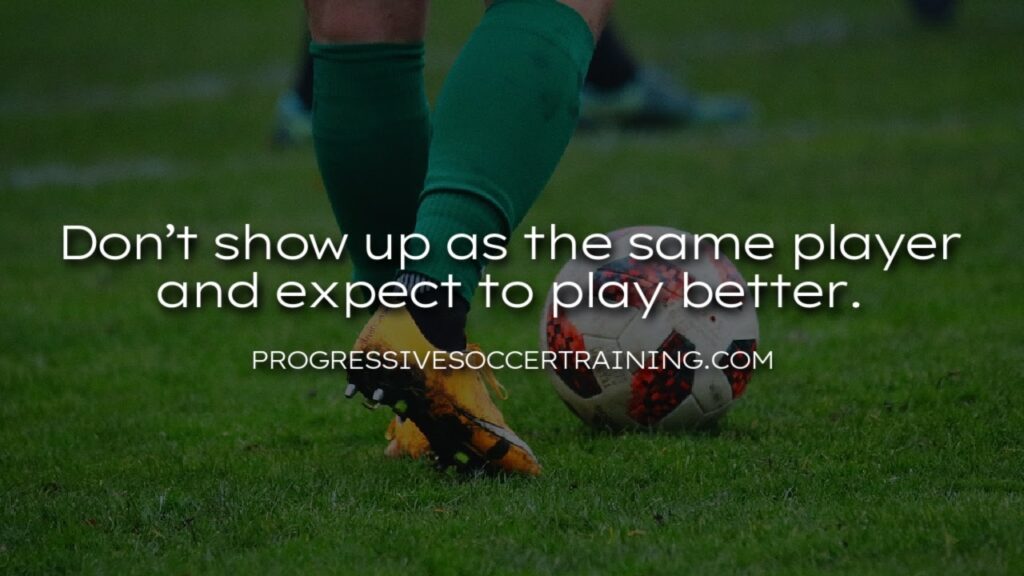
Free Soccer Planner
Are you tired of feeling like you’re not making progress in your soccer skills? Do you want to have a more organized and effective training routine? Do you struggle with setting and achieving your soccer goals?
If you answered yes to any of these questions, the Soccer Success Planner is for you. This planner will help you stay motivated, focused, and help you achieve your goals.
Set clear goals, track your progress, and stay accountable to yourself. With helpful prompts and exercises, you’ll be able to identify your strengths and weaknesses, plan your training sessions, and maximize your performance on the field.
Start taking control of your success in soccer! You can download it here (it’s 100% FREE) – The Soccer Success Planner
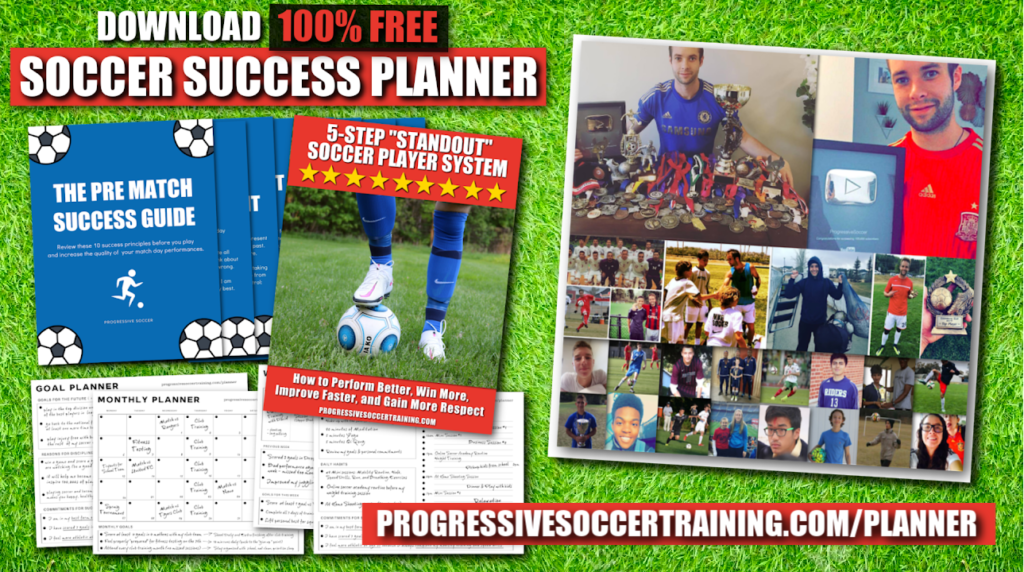
Want To Improve Faster?
Not getting better at soccer? Confused about how to train effectively? Maybe you’re worried that you won’t be properly prepared for your next big opportunity? Or you just want to standout and actually feel respected by your teammates, coaches, and friends?
Whatever struggles you’re going through, The Online Soccer Academy is the best solution to help you overcome obstacles and achieve goals. Thousands of satisfied players have already used this program to achieve incredible results in record time.
With expert coaching, structured player development systems, and easy-to-follow training routines, it’s guaranteed to elevate game.
Join today and start experiencing the transformation you’ve been waiting for! Get more information here – The Online Soccer Academy
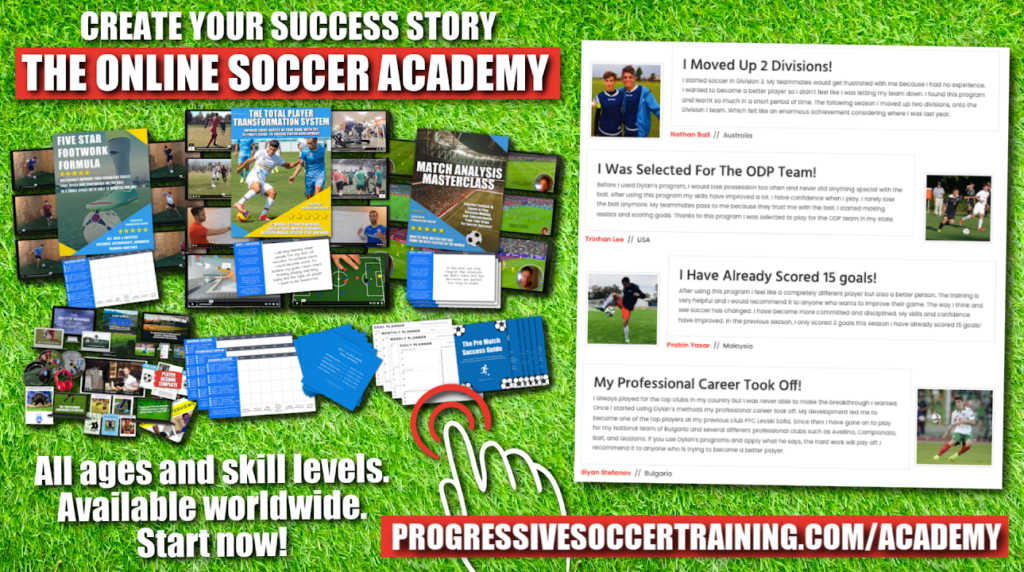
About The Author
I used to be a soccer player who struggled with self-confidence. I felt slow, weak, and unmotivated. My coaches didn’t pay much attention to me, my friends laughed at my lack of skills. At one point, I even became so discouraged that I quit the sport altogether.
Enough was enough. I decided to take control of my own development and set out on a journey to become a better soccer player. This path led me on an incredible journey of self-improvement.
I went on to win league and goal-scoring titles, earn awards, lift trophies, and received a college scholarship. I’ve even earned international caps for my country.
I started sharing my knowledge, teaching others how to become the best soccer players they could be. My YouTube channel grew to over 500,000 subscribers. I coached for top youth clubs and men’s teams. Then started my own soccer academy.
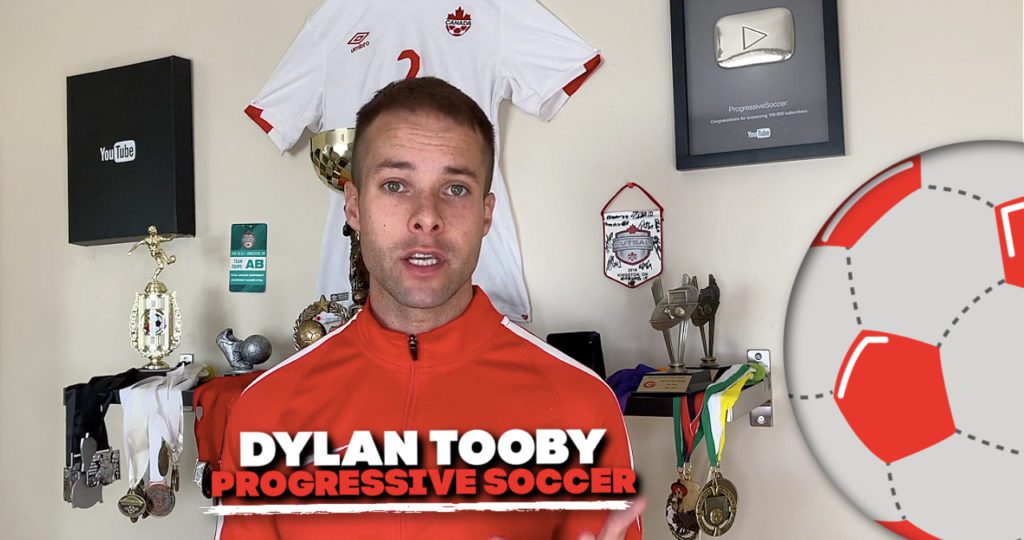
Become A Better Soccer Player
But enough about me, let’s focus on you.
If you’re looking to improve your skills, let’s take your soccer game to the next level. I want to help you make a noticeable change in style of play and overall performance on the field.
I’m passionate about helping players achieve their goals in soccer, and I’d love to be a part of your journey. I can help you reach your goals faster and achieve more in this sport, but I won’t force you. If you’re ready to take the next step, here’s what I suggest you do:
1) Download The Soccer Success Planner (FREE)
2) Apply To The Online Soccer Academy (Limited Spots)
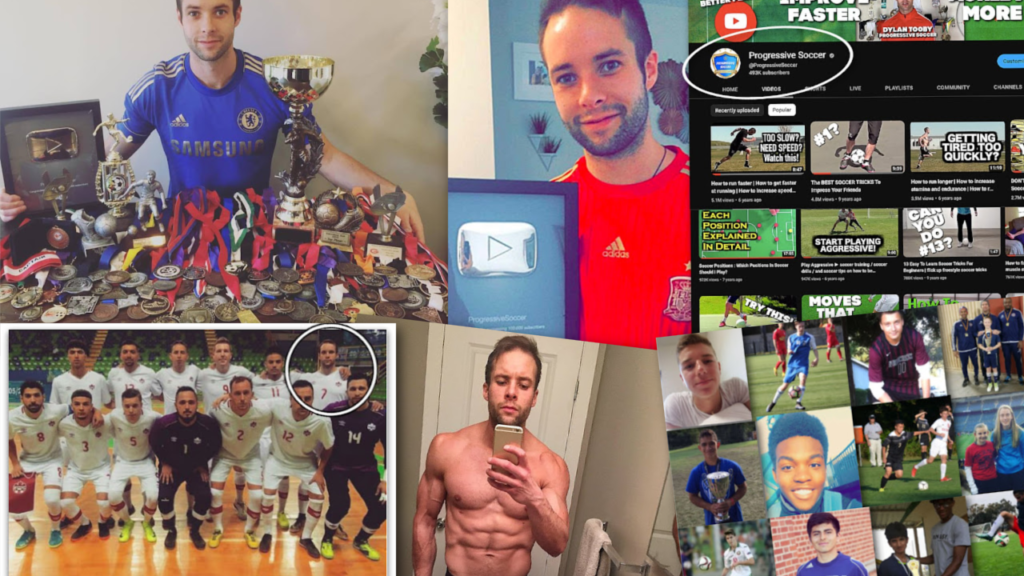
Want more soccer training content?
Here are some related soccer articles (and videos) you might enjoy:
How To Become A Better Soccer Player in 1 Day
From Failure To Top Goal Scorer
Wishing You Success In Soccer
Coach Dylan
Progressive Soccer
Thank you for reading this article:
What Should Soccer Players Eat (Before and After Games)
